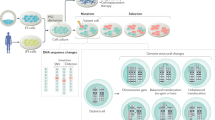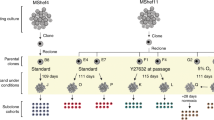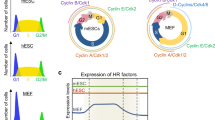Abstract
By analyzing five human embryonic stem (hES) cell lines over long-term culture, we identified a recurrent genomic instability in the human genome. An amplification of 2.5–4.6 Mb at 20q11.21, encompassing ∼23 genes in common, was detected in four cell lines of different origins. This amplification, which has been associated with oncogenic transformation, may provide a selective advantage to hES cells in culture.
This is a preview of subscription content, access via your institution
Access options
Subscribe to this journal
Receive 12 print issues and online access
$209.00 per year
only $17.42 per issue
Buy this article
- Purchase on Springer Link
- Instant access to full article PDF
Prices may be subject to local taxes which are calculated during checkout

Similar content being viewed by others
Accession codes
References
Maitra, A. et al. Nat. Genet. 37, 1099–1103 (2005).
Josephson, R. et al. BMC Biol. 4, 28 (2006).
Baker, D.E. et al. Nat. Biotechnol. 25, 207–215 (2007).
Loring, J.F. & Rao, M.S. Stem Cells 24, 145–150 (2006).
Wu, H. et al. Stem Cells 26, 1484–1489 (2008).
Rithidech, K., Bond, V.P., Cronkite, E.P., Thompson, M.H. & Bullis, J.E . Proc. Natl. Acad. Sci. USA 92, 1152–1156 (1995).
Rithidech, K.N., Dunn, J.J., Gordon, C.R., Cronkite, E.P. & Bond, V.P. Blood Cells Mol. Dis. 23, 99–109 (1997).
Tanner, M.M. et al. Cancer Res. 56, 3441–3445 (1996).
Guan, X.Y. et al. Cancer Res. 56, 3446–3450 (1996).
Tonon, G. et al. Proc. Natl. Acad. Sci. USA 102, 9625–9630 (2005).
Koynova, D.K. et al. Melanoma Res. 17, 37–41 (2007).
Midorikawa, Y. et al. Oncogene 25, 5581–5590 (2006).
Hurst, C.D. et al. Oncogene 23, 2250–2263 (2004).
Scotto, L. et al. Genes Chromosom. Cancer 47, 755–765 (2008).
Calin, G.A. et al. Proc. Natl. Acad. Sci. USA 101, 2999–3004 (2004).
Acknowledgements
This study has been supported in part by additional grants from Medicen Paris Region (IngeCELL), EC (FP6, STEM-HD) and ANR (HESCREEN). The authors thank K. Sermon (AZ-VUB, Brussels) for kindly providing VUB cell lines.
Author information
Authors and Affiliations
Contributions
N.L., M.P. and A.L.P. designed the study. N.L. carried out and analyzed CGH and SNP experiments. C.B. carried out the FISH experiments. N.L. and M.F. did all hES cell culture, except for that of H1 cells, which were cultured by O.F. The FISH experiments were designed and analyzed by G.T., A.B.-G. and C.B. A.B.-G. and G.T. edited the paper. N.L., M.P. and A.L.P. contributed to writing the paper.
Corresponding author
Supplementary information
Supplementary Text and Figures
Supplementary Figures 1,2, Table 1, Methods (PDF 1046 kb)
Rights and permissions
About this article
Cite this article
Lefort, N., Feyeux, M., Bas, C. et al. Human embryonic stem cells reveal recurrent genomic instability at 20q11.21. Nat Biotechnol 26, 1364–1366 (2008). https://doi.org/10.1038/nbt.1509
Received:
Accepted:
Published:
Issue Date:
DOI: https://doi.org/10.1038/nbt.1509
This article is cited by
-
Epigenetic repression of CHCHD2 enhances survival from single cell dissociation through attenuated Rho A kinase activity
Cellular and Molecular Life Sciences (2024)
-
TPX2 prompts mitotic survival via the induction of BCL2L1 through YAP1 protein stabilization in human embryonic stem cells
Experimental & Molecular Medicine (2023)
-
TPX2 Amplification-Driven Aberrant Mitosis in Culture Adapted Human Embryonic Stem Cells with gain of 20q11.21
Stem Cell Reviews and Reports (2023)
-
Acquired genetic changes in human pluripotent stem cells: origins and consequences
Nature Reviews Molecular Cell Biology (2020)
-
Functional in vivo and in vitro effects of 20q11.21 genetic aberrations on hPSC differentiation
Scientific Reports (2020)



